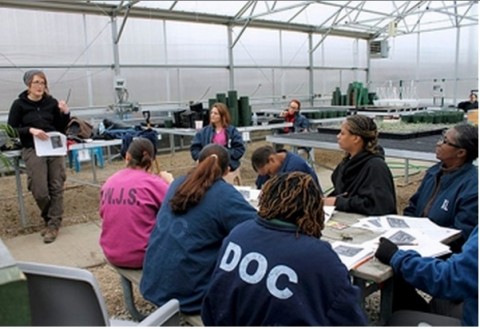
You’d never guess they were prisoners.
And inside a heated greenhouse on a chilly November morning just days before Thanksgiving, they’re really not.
In here, they’re budding gardeners, landscapers, horticulturists.
It’s part of the Cook County Jail’s Urban Farming Initiative. The program’s been in place for the past two decades, but under Sheriff Thomas Dart and the program’s deputy director, Kerry Wright, it has transformed. It’s gone from a therapeutic garden designed to get inmates out of their cells for a short time to a job-training initiative complete with a structured curriculum.
Take Sandra Mayze.
“My mother gardened when I was younger and she had beautiful plants, all different colors,” she said.
Mayze has been behind bars for 90 days. She’s been in the program for one.
Like the other 10 female inmates in this particular class, she’s hoping to get a few things out of it.
“An education, some information, maybe a job later on.”
The jail’s one-acre-plus outdoor garden is barren now, but come a few months earlier and you’re greeted by all of the brightly colored fruits and vegetables you can imagine– beets, carrots, tomatoes, zucchinis and much more.
Non-violent minimum-security inmates planted and harvested about 15,000 pounds of produce this year, Wright said, which was then sold to local restaurants, such as The Publican, Yosho, Sopraffina, Blackbird and Avec, and at the Daley Center Plaza Farmer’s Market. The money is mined back into the program to keep it self-sufficient.
In the 1,500 square-foot greenhouse, lined with trays of herbs and pots of soil, the enthusiasm is infectious. What begins for many as a chance to get a little air quickly turns into a passion.
“These are my cilantro plants,” said one inmate as she sprayed down the buds with water, a proud smile on her face. “I started them from the seed.”
Mortora Martin, 47, is now three weeks into the 12-week program. “At first I was like, ‘What am I doing here?’ Now I love it. I wish we could come five days a week.”
The program typically takes 30 male and 30 female inmates for each session and has them come in on alternating days – the men on Mondays, Wednesdays and Fridays and the women on Tuesdays and Thursdays. Wright said female inmates originally came one day less due to staffing – the men were housed in the building connected to the garden, so it was “easier for them to come out three times a week simply because of proximity.”
But with the current expansion underway, Wright said, the program is moving toward having two separate gardens so both men and women will be able to come five days a week.
The six weeks of instructional classes focus on all things agriculture-related–general gardening, farming and pesticide safety knowledge–while the six weeks of field training lets inmates get their hands dirty.
At first, 22-year-old Salome Mwananshiku, who is serving time for drunken driving, was hesitant.
“I’m girly,” she admitted. “I hate getting my hands dirty.”
But after the first few classes, she said she realized it wasn’t what she expected at all. “It’s therapeutic, I’m learning–and I feel more accomplished.”
Now, Mwananshiku and Alexis Carrasco, 23, are the old pros in the garden and greenhouse, having started the program close to three months ago. And Carrasco said both dread the days when poor weather interferes with their favorite part of the week.
“When I get scared that I’m not going to get to come, I get depressed, I get sad,” Mwananshiku added.
After a lecture about plant health from Wright, which was peppered with raised hands and curious questions, the students move from a table with their study guides filled with scribbled notes to a worktable filled with growing cilantro and tubs of earth.
Now, the students become the teachers.
With soil under her fingertips and dirt staining the front of her pink jail-issued jumpsuit, Mwananshiku begins mixing potting soil and water, molding it until it becomes the consistency of clay. After gentle prodding from Wright to not just do, but teach, she pauses to explain, step-by-step, the process of transplanting.
Quickly, a sense of camaraderie and competition is in the air as the women fight to show off their skills to newbies like Mayze while they simultaneously shy away from throwing on the instructor hat.
“Remember, be gentle,” Mwananshiku coaches Mayze, 56, as she digs into her own tubs. “Whatever suits you, but just don’t break it. If you break it, it’s a waste.”
The point of the urban garden’s expansion is to teach the inmates skills to lead them not only to so-called green-collar jobs but jobs in general. In this environment, they learn workplace-essential skills such as patience, leadership and ethics, Wright said.
Patience as they wait for their seeds to sprout, leadership through sharing their skills with each other and ethics through the hard work, long hours and manual labor that farming requires.
Wright also said the program recently started partnering with re-entry specialists in Chicago to help find the participants jobs after they’re released.
“Slowly but surely we’re really establishing valuable outlets for them to go to,” she said.
More than 1,500 inmates have gone through the program since it began in 1993, according to the Cook County Sheriff’s Office, and what sprouted as a 600-square-foot plot of land now encompasses 60,000 square feet of space at the jail’s Pre-Release Center at 3026 S. California Ave.
Inmates are chosen to participate based on behavior and often, Wright said, the program has a waiting list.
“If we have to go to Women’s Justice at all, Division 17, we get literally attacked by inmates asking why they haven’t been picked to go to gardening,” Wright said, laughing.
The cilantro buds are transplanted from the tiny plastic trays into larger pots, and Mwananshiku proudly dusts her hands clean of dirt.
Her release date is quickly approaching, and while that’s a relief for her, she understands all too well the struggles convicts face when they leave the confines of their cells.
“Because of my background, it would probably be hard for me to get a job,” she said, which is why she, along with the others, is now looking to enter an agriculture-related field when she’s out — landscaping, beekeeping and composting.
“I have until January here, but it’s good. At least I’ll still be able to come to gardening.”
SOURCE : Wednesday Journal Inc
| Arrest Date: | 2012-08-12 0:00 am |
|---|---|
| Booking Facility: | Cook County Sheriff |
| Major Population Center(s): | Chicago |
| Height: | 504 |
| Gender: | F |
| Age at Booking: | 21 |
February 5, 2014 Cook County, Illinois Officials: woman has been taken into custody, charged for a driving-related offense.
As reported by previously released information discovered by Midwest Blotter, acting officials in Cook County, IL have apprehended Salome Mwananshiku, a Female.
Ms. Mwananshiku was detained February 5, 2014, after having been jailed for a driving-related offense. No release date was provided in the report, as determined by Midwest Blotter.
Mwananshiku was described as a woman of unknown age. When booked, she weighed lbs.
Sources at Illinois Department of Corrections reported the case details as shown in the video above.
Midwest Blotter

 JOIN DRIVERN TAXI AS PARTNER DRIVER TODAY!
JOIN DRIVERN TAXI AS PARTNER DRIVER TODAY!










